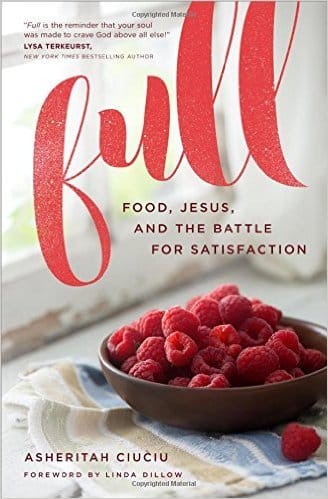Originally published Tuesday, 07 November 2017.
Do you ever wonder what Jesus would do if He were given a triple chocolate cream-filled cupcake?
Would He eat it?
Or would He politely pass?
Maybe it's just me and my WWJD-bracelet memories from junior high years, but sometimes I look at the food in front of me and wonder: What would Jesus do?
Would Would Jesus Eat?
If Jesus were living in the 21st-century western world, would He be on the Atkins Diet? Or Paleo? Or vegetarian? Or gluten-free?
- Would He grab a Diet Coke with a fast-food meal?
- Would He indulge in decadent dessert?
- Would He linger over a farm-to-table meal with friends?
- Would He go to an all-you-can-eat restaurant?
- Would He look up ingredients on the packaging of His breakfast?
You might chuckle and dismiss this article as irrelevant, but actually, I believe we should study how Jesus treated food in Scripture to correct the way we use food in our own lives. Recent statistics reveal that over 50% of American women are obese, with many more overweight. And those numbers inside the church are worse, not better. Young adults who regularly attend church are 50% more likely to be obese by the time they reach middle age (read the news story here).
Ouch.
That should make us pause for a moment.
There's something very wrong with that statistic.
Not Just a "Worldly Problem"
Obviously, we have a food problem. And it's just as bad inside the church as it is outside the church (in fact, it's slightly worse). The Western world is facing an obesity epidemic, and the orthorexic whiplash that we're beginning to see (an obsession with healthy eating) can be just as destructive.
I know.
Because this is personal.
This "food thing" isn't just some interesting news story that I read one day while browsing Facebook. I didn't just waste an afternoon on Wikipedia following rabbit trails from the entry on orthorexia nervosa (although there was that too). I battled food fixation in my own life, and it was hard. Isolating. Embarrassing. It's just not something that a missionary kid can easily fess up to: "Hi. I'm Asheritah. And I think about food. A lot."
This obsession with food is inside our church walls, and it's affecting our testimony to an onlooking world.
Because the truth is that whether we're obsessed with eating healthy food or comfort food, carrots or carrot cake, food fixation steals our attention from the only One who should capture our affection: the Bread of Life.
Whether carrots or carrot cake, food fixation steals our attention from our souls' proper affection.
And He is the only One who satisfies. Only Jesus.
Jesus and Food in the Bible
Let's take a moment to see how Jesus related to food in the Bible, and perhaps we will begin to understand where our thinking should change:
- Jesus fasted forty days in the wilderness in preparation for His public ministry (Matthew 4:1–4).
- Jesus taught His disciples to not worry about food and drink because God will take care of them (Matthew 6:25–26).
- Jesus dined with tax collectors and sinners, while the Pharisees called Him a “glutton and a drunkard” (Matthew 11:19).
- Jesus gave instructions regarding who to invite to dinner parties (Luke 14:12–14).
- Jesus had compassion on the crowds who were following Him without enough food for dinner, so He miraculously provided food for all (Matthew 14:15–21).
- Jesus defended His disciples’ lack of fasting during His lifetime, explaining that they will fast when He’s gone (Mark 2:20).
- Jesus made careful preparations to eat the Passover meal with His disciples before the crucifixion (Luke 22:7–13).
- Jesus chose bread and wine as symbols His followers would use to remember His sacrifice (Luke 22:14–20).
- Jesus blessed God for meals and broke bread before and after His resurrection (Luke 24:28–31).
- Jesus asked the disciples if they had food to eat after His resurrection (Luke 24:41–43).
- Jesus made breakfast for His disciples after His resurrection (John 21:9–13).
- Jesus used dinner parties and wedding banquets as pictures of the future kingdom of God (Matthew 22:2; Luke 14:16–24).
What do these vignettes tell us about the way Jesus related to food?
Jesus didn’t ignore His appetite, but He wasn’t controlled by it either.
He was able to both fast and feast, and He often gathered people around the table to fellowship at a deeper level.
We could spend an entire book unpacking each of these passages and learning so much more just from Jesus’ example in His relationship with food. But the overarching theme here is that Jesus enjoyed food while He lived on this earth; He knew both how to feast and to fast.
One of the clear takeaways is that food is NOT bad, but food fixation can easily become a stronghold in our lives if we’re not careful.
So would Jesus eat a cupcake? There's no clear Scriptural evidence to make an airtight argument, but based on the passages above, yeah, I think He would. I think if He were sitting at my kitchen table and I offered Him a cupcake, He would receive it with thankfulness and then invite me to sit with Him, to savor the sweetness of His presence that far surpasses anything I can whip up in the kitchen.
Jesus invites us to discover that His presence is sweeter than a chocolate cupcake.
This post is an excerpt from my book Full: Food, Jesus, and the Battle for Satisfaction. Discover the joy of living free from food fixation so you can experience deeper satisfaction in Christ, gain a renewed sense of purpose, and yes, even enjoy good food (without regret).
A healthier relationship with food through a stronger relationship with Christ—that’s the goal of Full. Read more or Take the 7-Day Truth & Dare Challenge.









